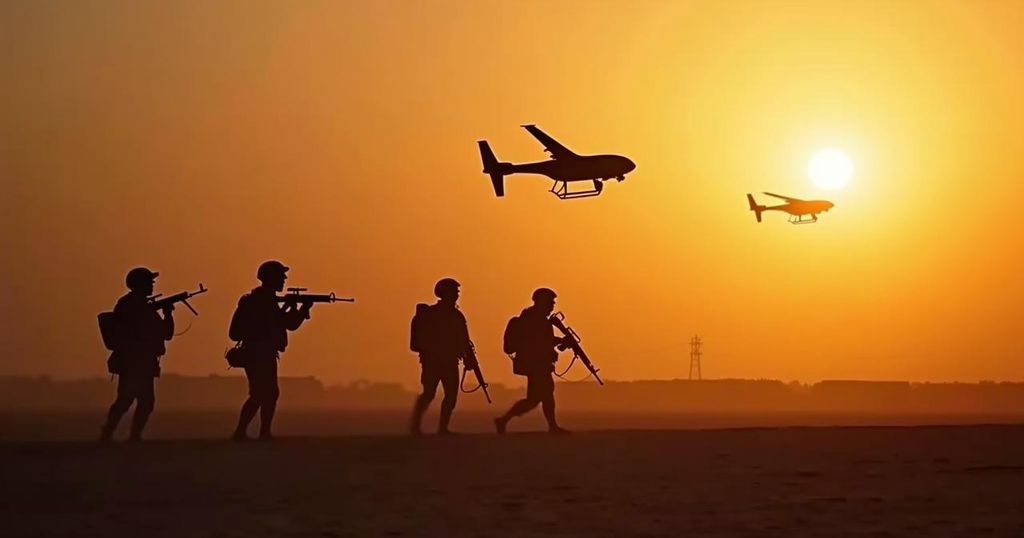On Friday, two Israeli soldiers were killed by a drone strike launched from Iraq, attributed to the Iran-backed Islamic Resistance in Iraq. This incident reflects the deepening conflict in the region, including Israel’s operations against Hezbollah in Lebanon, amidst rising tensions involving Iran’s military posture and widespread regional implications. The IDF continues to assess the situation as casualty numbers increase for both military and civilian populations.
On Friday, the Israel Defense Forces (IDF) reported the tragic death of two Israeli soldiers due to a drone strike that originated from Iraq, striking them while they were stationed at a base in northern Israel. The attack was claimed by the Iran-aligned Islamic Resistance in Iraq, which stated that it targeted three sites across northern Israel, including the regions bordering the Golan Heights and the city of Tiberias. However, it is yet to be confirmed whether the specific drone strikes that led to the soldiers’ deaths were indeed launched by this group, which has previously taken responsibility for attacks against Israel, albeit with limited success in terms of inflicting casualties. The incident comes amid escalating violence in the region, notably Israel’s ground operations in southern Lebanon against Hezbollah, which have resulted in significant casualties on both sides. Reports indicated that over 100 individuals died in recent skirmishes, and fears continue to grow regarding a broader conflict involving other regional actors, including Iran, which has publicly endorsed armed resistance against Israel. Following the attack, Iranian Supreme Leader Ayatollah Ali Khamenei declared the Oct. 7 assault that killed over 1,200 Israelis as “legitimate,” positioning it as justified retribution against Israeli actions. His rhetoric emphasized the necessity for unity among nations from Iran to Gaza to prepare for combat against perceived adversaries. Meanwhile, Iranian Foreign Minister Abbas Araghchi has warned of severe retaliation against any aggression by Israel. Concurrently, the United States has engaged in military operations targeting Iranian-backed Houthi forces in Yemen, further entrenching the regional power dynamics. As hostilities arise, both Israeli forces and Hezbollah have engaged in significant military actions, with substantial casualties reported on both sides. The situation remains fluid, with ongoing military campaigns, civilian evacuations, and critical humanitarian concerns emerging in the wake of this renewed violence. The global response, particularly regarding oil supplies and price surges, remains an additional concern as this conflict threatens to escalate further.
The ongoing conflict between Israel and its adversaries has intensified recently, primarily due to Iran’s support for militant groups such as Hezbollah and the Islamic Resistance in Iraq. These groups have increased their military activities against Israeli targets amidst a broader context of regional tensions following significant conflicts, including the Israel-Hamas war. The current events highlight the precarious security situation in the Middle East, where coordinated drone strikes and military operations have become increasingly common. The backdrop of Iranian political and military support complicates the situation, as Iranian leaders rally regional allies for collective resistance against Israel. Recent violence has drawn international attention, prompting discussions on military intervention and humanitarian responses amid grave concerns for civilian safety.
In summary, the drone strike that claimed the lives of two Israeli soldiers underscores the precarious security landscape in the Middle East, intensified by Iran’s support for militant actions against Israel. The ongoing military exchanges between Israeli forces and Hezbollah raise the stakes for regional stability, while international responses to these developments, particularly regarding military support and humanitarian interventions, play a crucial role in shaping future outcomes. Furthermore, rising oil prices reflect the global economic implications of escalating violence in this critical region.
Original Source: www.newsweek.com






